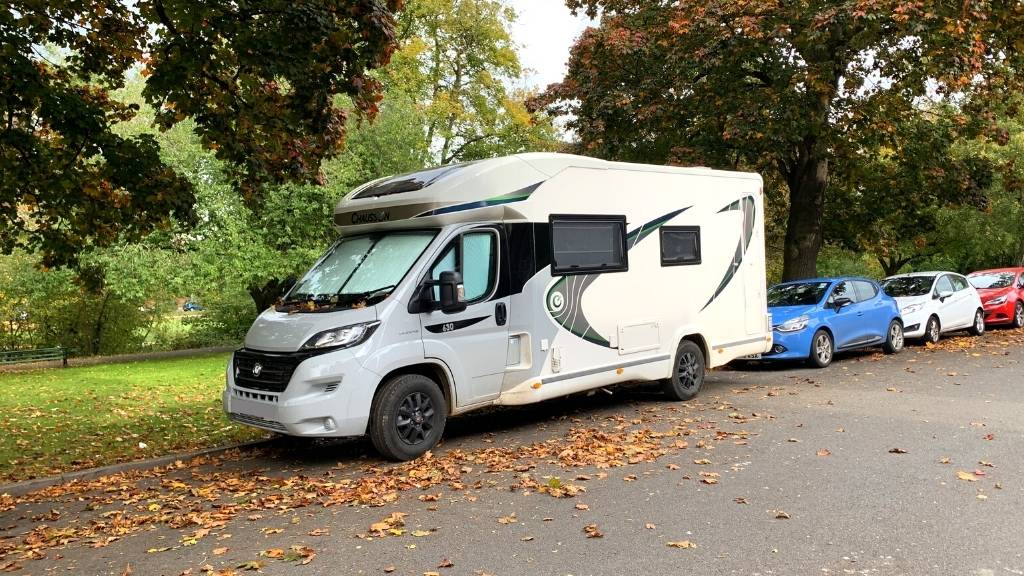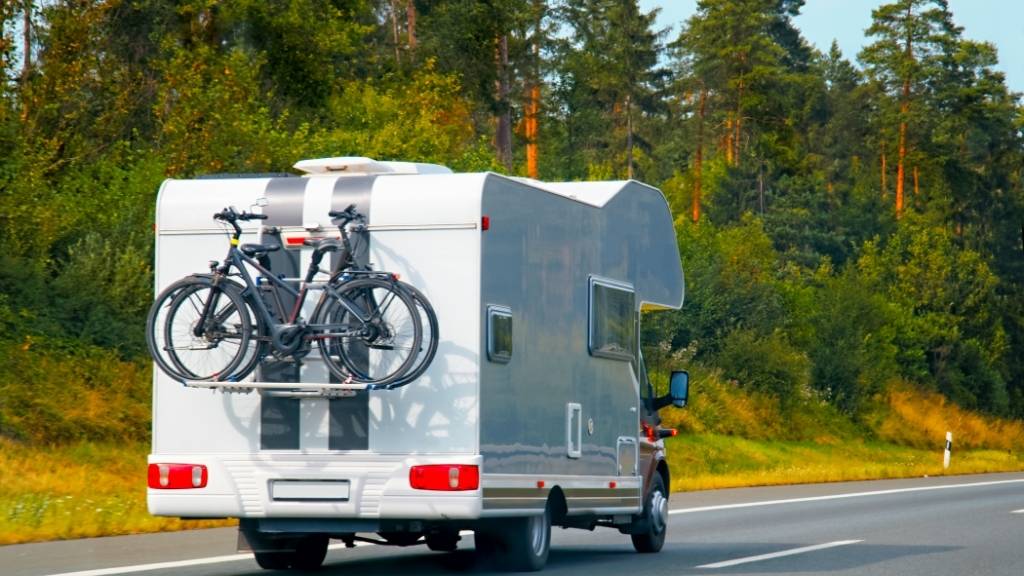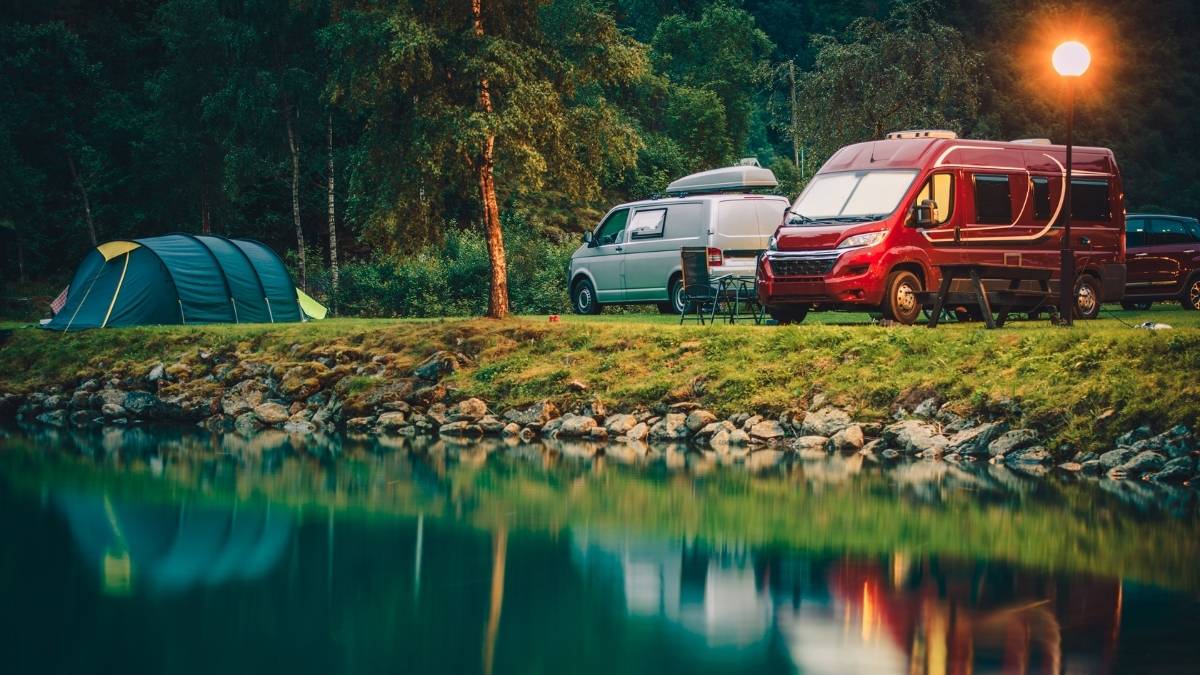Insurance for your campervan or motorhome is not as straightforward as car insurance. We compare the UK’s leading specialist leisure vehicle insurers, and what makes each of them different.
One of the key questions we had to consider when deciding whether we would invest in a campervan was how much it would cost to insure.
How much more expensive would it be to insure a campervan compared to our standard family car?
As it turned out, we were paying more for our standard family car insurance than we have ended up paying per year for our more valuable VW campervan.
Why is this? Our campervan was considerably more expensive to buy than our previous family car and it has loads of really cool kit built in to it. Wouldn’t that lend it to being more expensive to insure?
Apparently not. The reason seems to be that because a campervan or motorhome is used as a leisure vehicle it falls into a lower risk category.
I can’t speak for all campervan and motorhome owners, but our campervan is like another member of the family and we are extremely careful with it. These vehicles aren’t built for speed, but for practicality and comfort.
Not many boy racers are going to invest the tens of thousands it costs to buy one.
This is all good news for insurance companies, and van owners too.
- Campervan insurance: best price or best cover?
- How much is campervan insurance?
- Campervan insurers in detail
- Exclusions – when campervan insurance might leave you out of pocket
- Extra charges made by campervan insurance providers
- Car insurance legal cover, is it worth it?
- Campervan and motorhome insurance FAQ
- What are the different types of campervan insurance?
- Will campervan insurance cover all models of campervan?
- Campervan insurance – are your belongings covered?
- Is your campervan insured inside and out?
- Can you travel to Europe on your campervan insurance?
- How do campervan insurers decide how much to pay out for a total loss?
- Conclusion – which campervan insurance will we buy?
Campervan insurance: best price or best cover?
Every campervan owner’s particular requirements for insurance is going to differ.
For us, it isn’t just about the best price. Price comes into it but really we are looking for the best overall cover.
How much risk a person is prepared to leave themselves open to is a purely personal choice. We are fairly risk averse and would rather be well covered rather than skimp on the details.
For the previous 12 months we have been insured with Comfort Insurance. We chose them as the cover seemed quite robust and it came in at a palatable £314.71. They were recommended by other campervan owners too which was reassuring.
Rats, squirrels, and other vermin
We did have a reason to claim on the insurance during this last 12 months which it turned out fell under an exclusion clause. That was a very unhappy and expensive discovery.
Our lovely VW California Ocean suffered damage to the wiring due to rats or squirrels having a good chew on some vital components. That damage cost us a lot unfortunately and it has left us mindful of policy exclusions so we don’t fall foul of coverage again.
Our vermin experience might never happen again, especially after we took extra measures to protect us, but it has left us with an appetite to shop around and find the best campervan insurance we can get in the UK.
We called the UK’s most popular campervan insurance providers to drill down and learn what their campervan insurance cover includes and what it will cost us to buy. Read on to see what we found out.
How much is campervan insurance?
The table below compares eight of the most popular campervan insurance providers in the UK.
We asked for quotes based on a 2018 VW California Ocean.
| Insurance Company | Premium Cost | Accidental Damage Excess | Underwriter |
|---|---|---|---|
| Comfort Insurance | £297.09 | £200 | Aviva |
| LV | £320.55 | £400 | LV |
| Lifesure | £305.01 | £300 | AXA |
| Saga | £328.99 | £300 | Acromas |
| Adrian Flux | £386.81 | £550 | Markerstudy |
| AIB | £352.10 | £200 | Aviva |
| Caravan & Motorhome Club | £303.93 | £250 | AXA |
| NFU | £442.48 | £250 | NFU |
The criteria we provided for these quotes was:
- VW California Ocean 2018 (199cc diesel engine)
- Vehicle value – £55,000
- 2 drivers, each with 20+ years driving experience
- One low-value claim in the last 5 years (not related to this vehicle)
- 9+ years no claims bonus
- Social, Domestic and Pleasure use only (no commuting or business use)
- 8,000 miles per year mileage
- No tracker
- Thatcham category 1 alarm
- Includes no claims protection, where offered
These prices are specific to our quotation criteria but give you a guide of what you can expect to pay.
Campervan insurers in detail
So which insurer offers the best campervan insurance in the UK?
The answer will vary, depending on your own requirements.
Here we look in further detail at what each of the eight top campervan insurers offers in their campervan insurance policy wording.

Comfort Insurance
Excess: £200.
Internal accidental damage: Yes, as long as not caused by an electrical fault.
Personal belongings: £5,000 maximum. £400 per single item (no excess).
European travel: Nine months, max 180 days of consecutive travel.
Courtesy car: Seven days included as long as vehicle in for repairs. No replacement in the event of a total loss.
Death/Serious Injury: £15,000.
Third party property, injury or death: Maximum of £20,000,000.
Legal cover: Yes, up to £100,000 included.
Vermin exclusion: Yes.

LV Campervan Insurance
Excess: £400
Internal accidental damage: Yes, but only up to £1,000 to include personal belongings.
Personal belongings: Up to £1,000. Cutlery and clothing are included. Very restrictive on what they will cover. No camping equipment cover or effects that could be covered under home insurance.
European travel: 180 days.
Courtesy car: No, can add this feature for £19.90 or £29.90 extra depending on vehicle size.
Death/Serious Injury: £10,000.
Third party property, injury or death: Maximum of £20,000,000.
Legal cover: Not included. £100,000 of cover costs £25.99 extra.
Vermin exclusion: Yes.

Lifesure Campervan Insurance
Excess: £300.
Internal accidental damage: Yes.
Personal belongings: £3,500 maximum. £25 excess to claim for tents and awnings – no maximum value set. Single item claims £500 max aside from this.
European travel: 270 days per year.
Courtesy car: Yes, subject to availability.
Death/Serious Injury: £15,000 / £10,000.
Third party property, injury or death: Maximum of £20,000,000.
Legal cover: Not included. Can be added for £28.00 extra.
Vermin exclusion: Yes.
Note that Lifesure are an insurance broker and add a £27.50 brokers fee to the price.

Saga Motorhome Insurance
Excess: £300 accidental damage / £100 fire and theft.
Internal accidental damage: Yes.
Personal belongings: £1,500 maximum. £1,500 tents and awnings. Camping equipment £500 maximum, £100 per single item.
European travel: 12 months.
Courtesy car: Yes, if in for repair.
Death/Serious Injury: £5,000 or increase to £50,000 for £13 extra.
Third party property, injury or death: Maximum of £20,000,000.
Legal cover: Not included. £100,000 cover £27.99 extra.
Vermin exclusion: No.

Adrian Flux Campervan Insurance
Excess: £550. Excess reimbursement to £1,000 per annum for £52 extra.
Internal accidental damage: Yes.
Personal belongings: £2,000, with no single item maximum. £1,000 awning and gas bottle cover.
European travel: 180 days total.
Courtesy car: After an accident, but not theft or write-off.
Death/Serious Injury: £2,000 death/serious injury, or increase to £22,000 for £17 extra.
Third party property, injury or death: Maximum of £20,000,000.
Legal cover: Includes up to £100,000.
Vermin exclusion: Yes.
All vehicles over £45,000 value must have a tracker fitted.

AIB Campervan Insurance
Excess: £200.
Internal accidental damage: Yes, up to the value of the personal belongings cover.
Personal belongings: Up to a maximum of £5,000. £400-£500 per one item.
European travel: 270 days total but maximum 180 days consecutive.
Courtesy car: No, but can add on for £35 extra.
Death/Serious Injury: £5,000.
Third party property, injury or death: Maximum of £20,000,000.
Legal cover: Yes, cover for up to £100,000 included.
Vermin exclusion: Yes.
The premium quoted in the above table has been discounted by 12%, for membership to various camping clubs. These include the VW California Club, Wild Camping, Camping & Caravan Club, and Caravan and Motorhome Club.

Caravan and Motorhome Club Insurance
Excess: £250
Internal accidental damage: No.
Personal belongings: £5,000 contents cover, £1,500 awning and toilet tent (£25 excess) and £500 per single item after that.
European travel: 12 months.
Courtesy car: Yes.
Death/Serious Injury: £15,000 / £10,000
Third party property, injury or death: Maximum of £20,000,000.
Legal cover: Up to £10,000 included, or can extend this to £100,000 for £29.99 extra.
Vermin exclusion: Yes.
Membership of the Caravan and Motorhome Club carries a 5% extra discount (not applied in the example above).
The Caravan and Motorhome Club state that they will offer new customers a quote £25 cheaper than any renewal policy – excluding additional legal cover.

NFU Campervan Insurance
Excess: £250 damage / £150 theft.
Internal accidental damage: Covered up to a maximum of the personal belongings cover.
Personal belongings: £250 included, can extend this to £1,000 for an extra £10.
European travel: Unlimited.
Courtesy car: Yes.
Death/Serious Injury: £15,000 / £5,000.
Third party property, injury or death: Maximum of £20,000,000.
Legal cover: Up to £100,000 included.
Vermin exclusion: Yes.
NFU offers Mutual Assist RAC Cover as standard with this policy. This can be upgraded to a higher level of cover for an additional fee should it be needed.
The included Mutual Assist cover gives you roadside assistance a quarter of a mile or more from your home, one hour of roadside assistance and recovery to a garage within 20 miles if the campervan is not repairable.
Exclusions – when campervan insurance might leave you out of pocket
With any insurance policy it is always prudent to read the small print. Looking at the price and your excess payment is not enough.
Be aware of what the maximum cover is for personal belongings and injury and when you are not covered, even though you thought you might be.
Typical campervan insurance exclusions
- You are responsible for the first part of the claim (the excess).
- Loss or damage of your motorhome if it has been left unattended with the keys in the ignition.
- Loss or damage resulting from any window, roof opening or removable roof panel being left open or unlocked.
- Any loss or damage to your motorhome if it is being used for a purpose not described on your Certificate of Motor Insurance.
- Loss or damage arising from your motorhome being driven by someone other than the named driver(s) on the Certificate of Motor Insurance.
- Damage arising from wear and tear.
- Any consequence as a result of war or terrorism – except where cover must be provided under the Road Traffic Act.
- Loss of vehicle value following a repair
- Loss or damage to the motorhome caused by an Earthquake, riot or civil commotion outside of Great Britain, the Isle of Man or the Channel Islands.
- Damage due to radioactive contamination, pollution, or contamination.
- Loss or damage deliberately caused to your car by anyone insured under your policy.
- Loss or damage to the motorhome caused by insects, pets, or vermin. Vermin and insects are defined as rats, mice, squirrels, owls, pigeons, foxes, bees, wasps, and hornets.
Related article: Campervan Security – The Ultimate Guide
Extra charges made by campervan insurance providers
Be aware that some insurers charge for amendments. For example you could expect to pay:
- Policy cancellation – £40 (although there is usually a 14 day cooling-off period from date of purchase).
- Change vehicle or driver – £15.
- Incorrect information amendment – £15.

Car insurance legal cover, is it worth it?
Typically the extra legal cover will set you back between £25-30 on top of your annual policy cost. Is this extra cost worth paying for?
What is car insurance legal cover?
In a nutshell, car insurance legal cover will pay for legal expenses you may incur in the event of an accident that wasn’t your fault.
This cover pays out for legal costs involved in for claiming compensation for losses you have suffered that aren’t covered by your insurance. These are referred to as uninsured losses.
Uninsured losses can include personal injury (to yourself or passengers), damage to your vehicle or possessions if you don’t have a comprehensive insurance policy, loss of earnings, and any insurance excess you’ve had to pay out.
It is important to understand that legal cover only covers solicitors fees and costs, typically up to £100,000, not the compensation payments for the losses.
Just as a side note, some insurers will only allow a claim to be made under their motor legal protection policy if there is a 50% chance or better likelihood of success of the recovery of those losses, so once again do read the small print and be aware of what you’re actually entitled to.
A nice perk is many of the legal cover policies offer access to a helpline which you can call for any legal issue, not necessarily motor-related. Check with your insurer if this is included.
Alternative protection from uninsured losses
What if you decide to pocket the £25-£30 extra fee for legal cover? Are you completely without protection?
This needs consideration, especially as it has been estimated that there are over one million uninsured drivers on our roads in the UK.
The good news is that in the UK there exists an organisation called the MIB. They are a non-profit organisation set up by motor insurers to protect motorists in the UK from financial losses resulting from an accident with an uninsured or untraced driver.
The Road Traffic Act 1988 requires that every insurer that underwrites compulsory motor Insurance must be a member of the MIB and must contribute to their funding. Every car insurance premium, therefore, contains a contribution to MIB.
Claiming under MIB
If you are hit by an uninsured driver, or an untraced driver you can claim through the MIB. There is no guarantee that they will refund your losses but they have a claims process any victim is entitled to apply to.
Without legal cover, however, you’ll be doing the MIB paperwork and follow-ups yourself unless you pay for a solicitor yourself.
The process they follow is:
- establishing the facts
- confirming the identity of those involved
- obtaining independent reports from motor engineers or witnesses
- obtaining a police report
- contacting other bodies such as the DVLA, your insurer or a foreign bureau.
If there is a claim for personal injury they will need to see any copies of medical records from your GP and any hospital you attended after the accident or any other independent medical report.
They undertake to resolve claims within a three month time period.
If you would like to have more certainty about your protection, it’s best to fork out the £25-30 and take out the legal cover that campervan insurers offer. Belts and braces.

Campervan and motorhome insurance FAQ
What are the different types of campervan insurance?
Campervan or motorhome insurance is similar in nature to car insurance but you do legally need specific campervan or motorhome insurance to cover your motorhome.
There are three types of cover you can buy – fully comprehensive, third-party fire and theft, and third-party only.
Fully comprehensive
A fully comprehensive policy covers you against accidental damage. These policies always cover for external damage and depending on the policy, internal damage. Also included is damage from fire (though not always from using your cooker), theft, and malicious damage (vandalism). It also covers you for damage or injury you cause to a third party.
Third-party fire and theft
With this type of policy, you lose the accidental damage cover and the malicious damage cover. You are still covered for fire and theft of your own vehicle and damage or injury to another person.
Third-party only
A third-party only insurance policy offers cover for damage or injury to a third party only. Not all insurers will offer this lesser level of insurance.
Given that motorhomes are usually high-value vehicles it makes the most sense to stick with fully comprehensive insurance. Repairs are often expensive and there is always a risk of accidents.
Will campervan insurance cover all models of campervan?
Yes, most insurers will cover all types of campervan. Factory-built camper vans tend to come in cheaper than conversions.
There has also been an increase in the theft of Ford campervans meaning some insurers will not offer insurance for those makes or may charge a higher premium.
Campervan insurance – are your belongings covered?
The main differences between car and campervan or motorhome insurance is all the gear you have on board. Some of it removable, some of it fixed.
As this is motorhome and camping equipment and awnings are usually packed in the van for a trip you would want to find cover that will protect you for the loss or damage of all that kit.
Check your home contents insurance: portable items such as mobile phones, iPads, documents, jewellery and wallets are often included in that policy.
For this reason, campervan insurance will often not cover these items and will instead focus on the personal belongings which make this a campervan or motorhome.
Some insurers do not include tools and equipment and you may find that camping equipment falls under this category, so you have no cover for your kit at all.
It is definitely worth asking all the questions and understanding what exactly is covered.
Is your campervan insured inside and out?
It’s a yes and no answer to this question.
If you have fully comprehensive insurance, which you most likely will, then external damage to your vehicle or a third party is always covered.
What is murkier though is whether internal damage is also covered. This comes down to the individual insurance policy and what they offer. We have explored the pros and cons cover of each of the eight insurers contacted by us in more detail above.
Internal damage, even if covered, often has exclusions or limitations. Always check the policy details carefully.
Can you travel to Europe on your campervan insurance?
Nearly all insurers extend their cover to Europe for several months of the year and in some cases, the whole 12 months of the policy period.
There is often a maximum consecutive number of days requirement, for example 180 days.
How do campervan insurers decide how much to pay out for a total loss?
The loss adjusters appointed by the campervan insurers will refer to the Glass’s Guide – which is a real-time guide of vehicle values used throughout the motor industry.
If your policy is for a new motorhome or campervan, many insurers will offer a new motorhome replacement clause to their policy for the first 24 months from the vehicle’s registration date.
This means you receive a brand new motorhome in the event of a total loss.
Conclusion – which campervan insurance will we buy?
I started this article feeling a bit anti-Comfort Insurance based on our rat/squirrel damage and Comfort’s vermin exclusion clause.
Having spoken to so many other insurers, however, I’ve come round to favouring them again. As I said at the start, our decision is not based on price alone – the overall cover has got to be good.
Comfort Insurance and AIB are both underwritten by Aviva yet the cover offered differs slightly and there is a big difference in the price of each policy.
Both Lifesure and the Caravan and Motorhome Club insurance are underwritten by AXA but their cover differs slightly with Lifesure offering internal damage cover but no legal cover and the CAMC offering the opposite. Both are similarly priced but Lifesure has an additional broker’s fee to pay.
In an ideal scenario, we would like:
- Low policy premium price
- Excess £300 or lower
- Internal and external damage included
- European travel included
- Vermin/Pet/Insect damage included
- Legal cover included
This is asking a lot, I appreciate. If you look through the details of what the various insurers offer though you can see Comfort Insurance ticks the boxes on five out of six of these points.
We can concede the 6th point as we have taken measures to prevent us from being attacked again.
Coming in second would be Saga. They do have a requirement that one of the named drivers has to be over 50, but we meet that criteria.
They also offer five out of the six ideal scenario points, they don’t include legal cover which is what has swung it for us. Adding the extra amount the Saga policy costs on top of the extra legal cover, in total we are looking at an additional £59.89 over going with Comfort Insurance.
Conclusion – It’ll be a renewal with Comfort Insurance for us!
Related article: Excess Insurance for Campervan Hire
